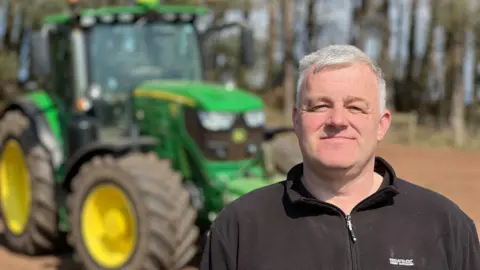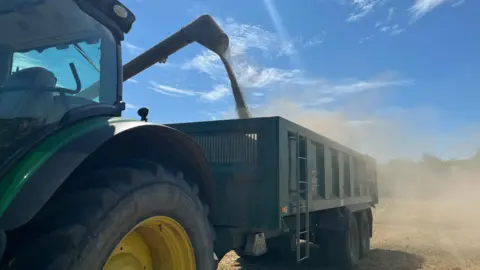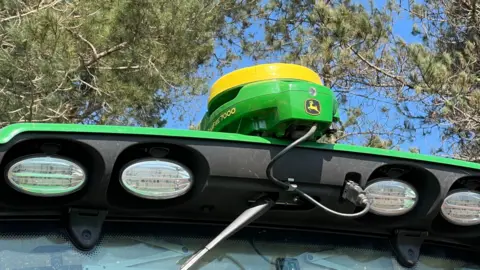How to tackle 'entrepreneurial' rural criminals?
 BBC
BBCExperts think "entrepreneurial" criminals are increasingly being drawn to lucrative crime in the countryside. And despite efforts to tackle the problem, questions remain over whether the government is doing enough.
Paul Coates was working through a busy April on his Cumbrian farm two years ago when thieves stole GPS units from two tractors.
The crucial guidance systems help his vehicles cultivate soil, sow seed and spread fertiliser efficiently, so no part of the ground is covered twice.
Thankfully the equipment, worth nearly £30,000, was insured, but the loss was disruptive to his beef, sheep and arable business near Armathwaite.
Then it happened again in October 2023.
He said: "It feels that somebody's come into your space. What gives them the right to come into our yard?"
He is not alone, NFU Mutual's rural crime report last year found the cost of GPS thefts surged 137% between 2022 and 2023.
Criminologist Kate Tudor specialises in rural crime and spends much of her time speaking to people who carry it out.
The Durham University academic said the thieves were "positively entrepreneurial", responding to demand in the market.

'Woeful security'
She added that it made "business sense" for criminals to target the countryside, as it was "high reward, low risk," with relatively few police officers and lots of valuable equipment to steal.
The government is planning to introduce new regulations that would require manufacturers to make all-terrain vehicles such as quad bikes more secure, using immobilisers and forensic marking.
Dr Tudor called the legislation "long overdue" and said it should cover GPS systems and tools as well.
She said: "Security on some machines is really woeful in that some can be started by a universal key, some have no forms of immobilisation, and so this makes them really easy to steal."

She added that during her research some manufacturers admitted thefts added to their sales, because farmers must buy replacements.
Sam Durham, the National Farmers' Union's (NFU's) national policy lead on rural crime agrees security is a problem.
"We think it's about time that all these manufacturers started taking this security seriously and making sure that farm equipment is just as difficult to steal as vehicles that drive on the road," he said.
The Agricultural Engineers' Association (AEA), which represents farm equipment manufacturers, rejected the idea companies profited from thefts and said the industry was "actively addressing the problem".
Funding for national unit
The trade body said: "Over 75% of agricultural vehicles are already forensically marked, demonstrating a firm commitment to tackling rural crime."
It said it agreed with the aims of the proposed regulations, but that they could clash with product safety law.
The Equipment Theft (Prevention) Act was passed in 2023, but secondary legislation, expected later this year, is needed to bring the new rules into force.
Dr Tudor and the NFU praised the work of the National Rural Crime Unit, established in 2023, but also called for more public funding for the body.
The unit helps coordinate the efforts of local forces, with many of the groups engaged in rural crime working over large areas of the country.
The Home Office said it had put £365,000 into the National Rural Crime Unit, which was helping to "target serious organised crime groups".
"We have committed to implementing the Equipment Theft Act and will engage with those most affected to inform next steps," a spokesperson added.
